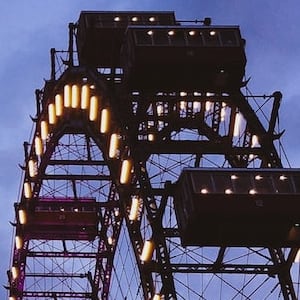cheap thrill: Idiom Meaning and Origin
What does ‘cheap thrill’ mean?
The idiom "cheap thrill" refers to a brief moment of excitement or enjoyment that is easily attained but lacks depth or lasting value. It implies a low-cost or easily accessible source of temporary pleasure, often highlighting a lack of substance or significance.

Idiom Explorer
The idiom "fifty-cent tour" refers to a quick or superficial tour that does not provide a comprehensive experience or understanding. It suggests a low-cost and rushed approach to exploring or learning about something.
The idiom "E ticket" refers to something that is considered excellent, exciting, or top-quality. The term originated from the old practice of issuing E tickets for the most thrilling and popular rides at Disneyland.
The idiom "easy pickings" means something that is very easy to obtain or achieve, often because it is unguarded or vulnerable.
The idiom "easy come, easy go" means that something acquired quickly or easily is just as easily lost or taken away.
The idiom "dime's worth" implies a small or insignificant value, often used to express the lack of significance or impact of something.
The idiom "delight in" means to take great pleasure or enjoyment in something. It expresses a strong positive emotion or satisfaction towards a particular activity, situation, or person.
An idiom meaning to take shortcuts or do something in a faster or easier way, often sacrificing quality or thoroughness. It is used to describe a situation where someone tries to save time, money, or effort by finding an easier or quicker way to achieve a goal.
The idiom "crack a smile" means to suddenly show a brief smile or to finally smile, often when one is feeling unhappy or trying to hide their emotions.
The idiom "chump-change" refers to a small or insignificant amount of money or anything of little value. It implies that the amount mentioned is not worth much and is easily dismissed or disregarded.
Unveiling the Untold Thrills
The idiom "cheap thrill" is a commonly used expression in the English language. It has a specific meaning that is widely understood by native speakers. When analyzing this idiom, there are several key points to consider.
Firstly, the word "cheap" in this idiom refers to something that is low cost or of little value. It suggests that the thrill being described is not significant or substantial. Instead, it conveys a sense of short-lived excitement that is easily attainable.
Secondly, the word "thrill" in this idiom refers to a feeling of excitement, pleasure, or exhilaration. It implies a temporary rush of adrenaline or an intense emotional experience. "Thrill" is often associated with activities or situations that evoke strong emotions.
When combined, the idiom "cheap thrill" conveys the idea of experiencing a brief moment of excitement or pleasure that is easily attainable or obtained without much effort or cost. It suggests that the thrill being described is not particularly meaningful or significant in the long term.
This idiom is commonly used in colloquial speech and informal writing. It is often used to describe fleeting moments of enjoyment or excitement that do not have a lasting impact. For example, someone might say "Going on a roller coaster was just a cheap thrill" to express the idea that the experience was enjoyable but not particularly profound.
Furthermore, the idiom "cheap thrill" can also be used sarcastically or ironically. In this context, it may imply criticism or disapproval of someone's pursuit of shallow or superficial excitement. For instance, if someone spends a lot of money to attend a concert but is ultimately disappointed, another person might comment "Well, that was a cheap thrill" to express their disdain for the wasted effort or resources.
It is worth noting that idioms like "cheap thrill" can vary in meaning and usage across different cultural contexts. The interpretation and connotations of this idiom may also depend on the speaker's tone of voice and the overall context of the conversation.
The idiom "cheap thrill" is commonly used to describe a momentary feeling of excitement or pleasure that is easily obtained without much effort or cost. It conveys the idea of a thrill that is not significant or substantial in the long term. This idiom can be used both literally and sarcastically, depending on the context and the speaker's intention.
Now let's explore how "cheap thrill" is related to other idioms:
The idiom "quick buck" refers to making money quickly and easily, often through dishonest or unethical means. While "cheap thrill" implies a momentary feeling of excitement or pleasure, "quick buck" suggests a focus on monetary gain. Both idioms share the idea that the result is not particularly lasting or substantial, but "quick buck" emphasizes the financial aspect. For example, someone might say "Selling fake designer handbags is a quick buck, but it's just a cheap thrill" to convey the idea that the temporary excitement of making money is not worth the ethical implications.
The idiom "cut corners" means to do something quickly or in a careless manner, often sacrificing quality or completeness. While "cheap thrill" refers to a momentary feeling of excitement or pleasure, "cut corners" focuses on taking shortcuts or avoiding the proper steps. Both idioms convey the idea of a lack of thoroughness or commitment, but "cut corners" implies a more deliberate action. For example, someone might say "He finished the project early, but he definitely cut corners along the way. It was a cheap thrill for him, but now we have to deal with the consequences" to highlight the short-term satisfaction of completing the project quickly without considering the long-term impact.
The idiom "fifty-cent tour" refers to a quick or cursory tour of a place or experience. While "cheap thrill" suggests a momentary feeling of excitement or pleasure, "fifty-cent tour" emphasizes a brief or superficial exploration. Both idioms share the idea of a temporary experience or limited engagement, but "fifty-cent tour" focuses on the act of touring or exploring. For example, someone might say "Visiting the museum was just a fifty-cent tour for us. It was a cheap thrill, but we didn't really get to fully appreciate the exhibits" to convey the idea that they had a brief and shallow experience at the museum, lacking in depth or understanding.
The idiom "adrenaline rush" refers to a sudden surge of energy or excitement, often accompanied by a release of adrenaline. While "cheap thrill" implies a temporary feeling of excitement or pleasure, "adrenaline rush" highlights the physiological response and increased energy levels. Both idioms share the idea of heightened emotions or sensations, but "adrenaline rush" emphasizes the physical aspect. For example, someone might say "Skydiving gave me an adrenaline rush, but it was just a cheap thrill. I didn't feel any lasting impact or fulfillment."
The idiom "cheap thrill" describes a momentary feeling of excitement or pleasure that is easily attainable or obtained without much effort or cost. It conveys the idea of a thrill that is not significant or substantial in the long term. This idiom can be used both literally and sarcastically, depending on the context and the speaker's intention. Additionally, it can be related to idioms such as "quick buck," "cut corners," "fifty-cent tour," and "adrenaline rush" to further emphasize different aspects of temporary and superficial experiences. However, it's important to note that the interpretation and usage of these idioms may vary across different cultural contexts and personal interpretations.
Example usage
Examples:
- He always enjoyed going to the amusement park because the roller coaster gave him a cheap thrill.
- She gets a cheap thrill out of scaring her friends with spooky stories.
- Watching a horror movie alone at night can provide a cheap thrill for some people.
Analysis:
The idiom "cheap thrill" is used to describe something that provides a brief and simple excitement or pleasure, often without much effort or cost involved. It conveys the idea of deriving enjoyment from a simple or easily attainable source.
In the first example, the amusement park's roller coaster offers a cheap thrill to the person mentioned. This suggests that the person finds excitement and enjoyment from the roller coaster ride, despite it being easily accessible and not requiring much effort or expense.
The second example showcases someone who takes pleasure in scaring their friends with spooky stories. The enjoyment derived from this activity is considered a cheap thrill, as it is a simple and easily achievable form of amusement.
In the third example, watching a horror movie alone at night is mentioned as a source of cheap thrill for some individuals. This implies that these individuals find excitement and pleasure from the easily accessible and low-cost activity of watching a scary movie in a specific setting.
More "Entertainment" idioms



